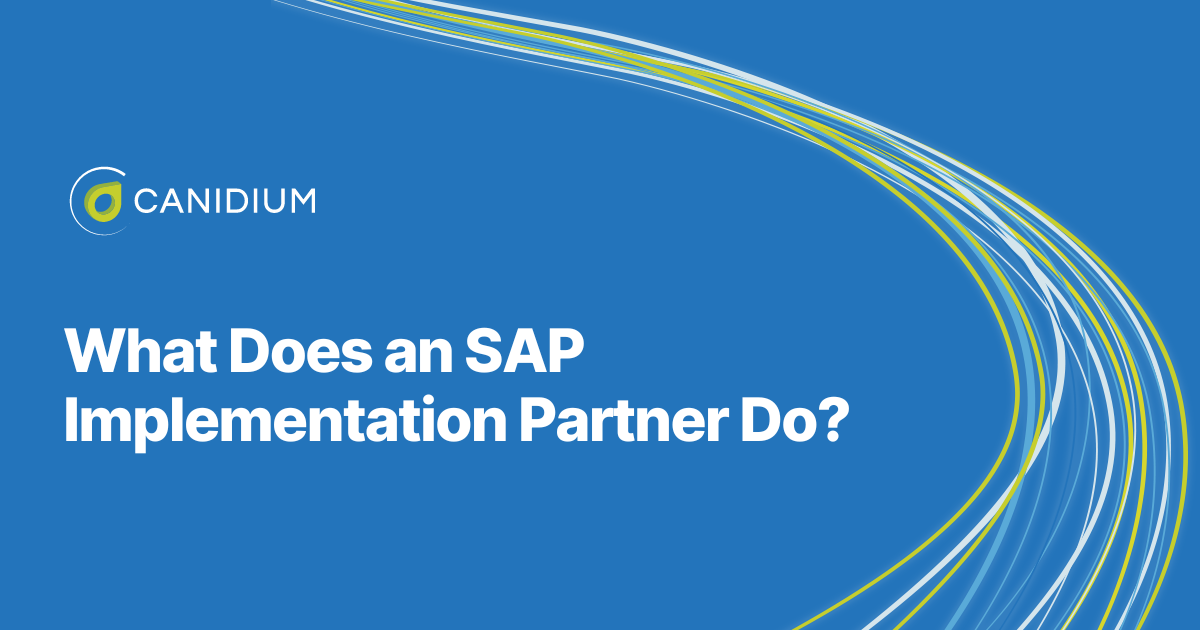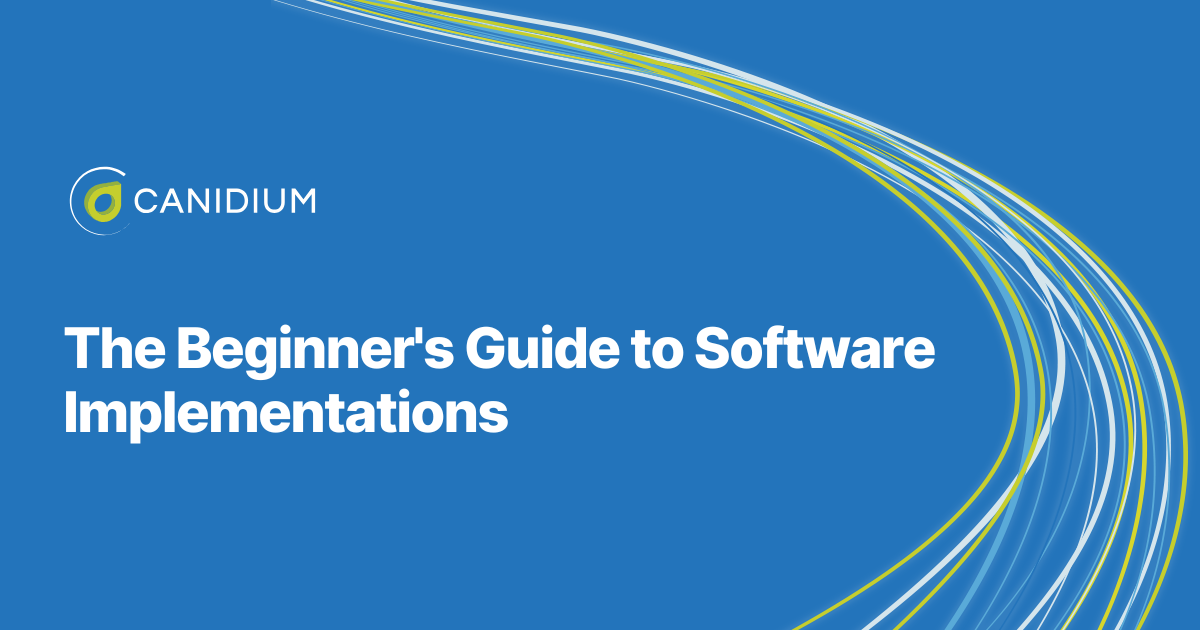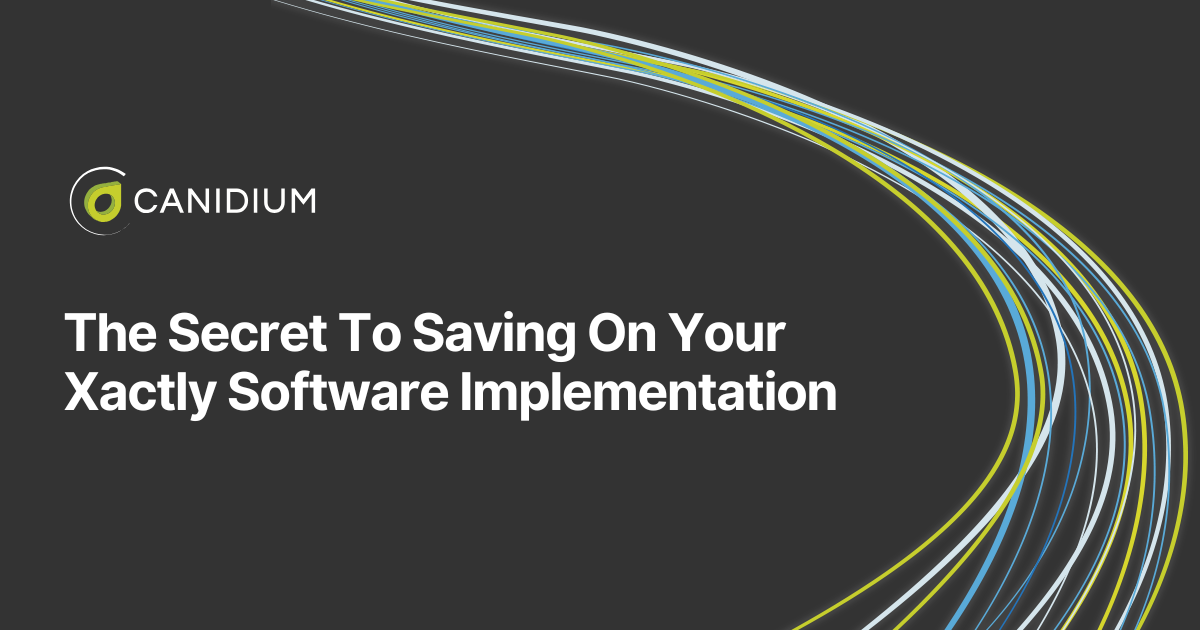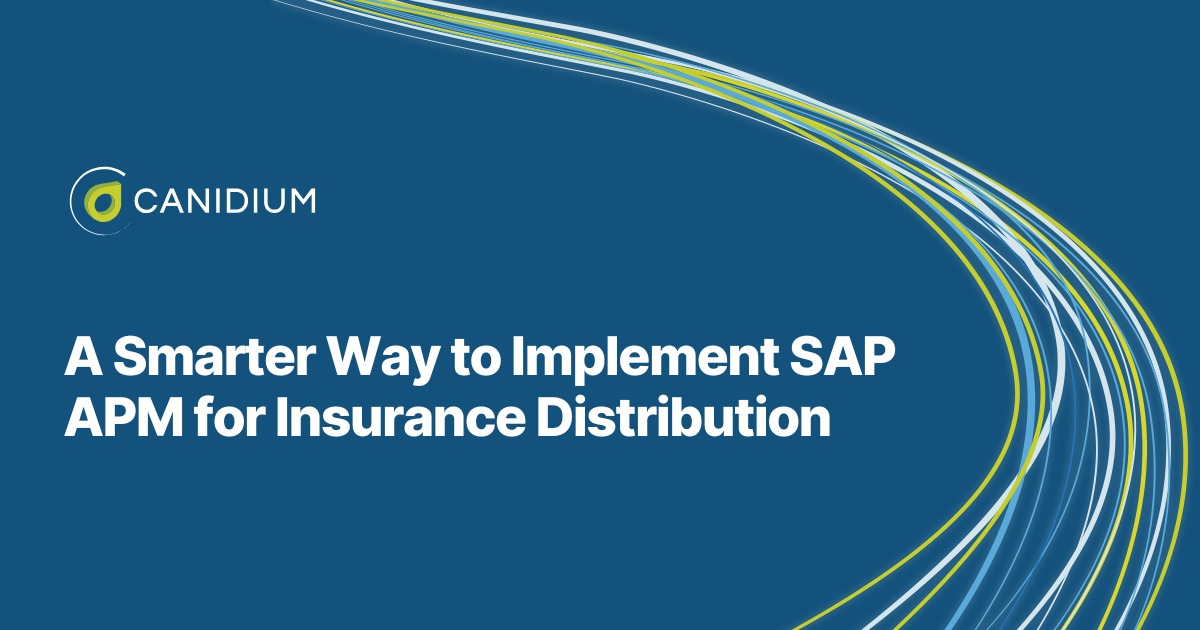Implementing an SAP solution is often a more complicated process than you might initially expect. Even if you have an SI expert to guide you, you still may be uncertain about the specific roles and responsibilities of an SAP implementation partner, the extent of customization and configuration needed, and the additional services that may be required beyond the standard implementation package.
At Canidium, our team of SAP experts educates clients on best practices for implementations, clarifying the complicated process of integrating a new solution.
This guide provides a straightforward explanation of what SAP implementation partners do, covering the services and roles that are standard for implementations and those that are not.
- What an SAP implementation partner does for their clients
- What services are not standard for an SAP implementation?
What an SAP Implementation Partner Does for Their Clients
Simply put, SAP implementation partners are third-party solution experts who specialize in configuring and integrating SAP tools into existing organizational infrastructure and workflows. However, the complexity of your existing business systems and the advanced nature of some SAP solutions mean a wholesale implementation requires a more in-depth explanation.
Software Implementation (SI) partners manage the entire process. They design, configure, and implement your solution according to your organization's unique needs, requirements, and goals. As a result, the solution seamlessly integrates with the rest of your business systems, increasing the efficiency of your infrastructure and maximizing the value of your software investment. SAP implementation partners specialize in SAP's suite of solutions and tools specifically.
SAP is a vast suite with numerous modules catering to different business functions. Specialized partners possess in-depth expertise in specific SAP modules, whether SAP S/4HANA, SAP SuccessFactors, or SAP Ariba. Familiarity with SAP solutions allows implementation partners to optimize your system for the best performance. The quality of your SAP solution implementation will impact the efficacy of your resulting system. The process is vital and complex.
Here is a breakdown of your SAP implementation partner's role:
.png?width=1920&height=1080&name=Heading%20(16).png)
1. Designing, Configuring, and Implementing SAP Solutions
The foremost task your SAP implementation partner handles is structuring, configuring, and integrating a scalable solution with your existing IT infrastructure. Advanced SAP solutions to manage functions such as commissions for enterprise or mid-level businesses do not work out of the box, so they must be tailored to fit the organization's unique needs and uses. By meticulously configuring the system to align with your specific business processes, your implementation technology partner guarantees that the new setup complements your operational workflows without disrupting them.
The partner's responsibilities extend to a thorough analysis of your current systems, including data sources, reporting needs, and interconnections within your IT landscape that are critical for commission calculations and reporting. This holistic approach ensures the SAP system functions efficiently and meets your business requirements. Based on industry best practices and the partner's extensive experience, recommendations are made throughout the implementation process. This collaborative effort helps identify potential improvements and customize the system to better suit your needs, ensuring that you receive a robust and effective SAP solution.
SAP implementation partners bring specialized expertise and a deep understanding of vendor technologies and incentive compensation workflows. This expertise ensures the SAP system is tailored to fit your existing IT infrastructure and business processes, enhancing functionality without disrupting ongoing operations. Implementation partners manage the complex tasks of system customization, integration, and deployment, significantly reducing the risk of costly errors and downtime. Moreover, their experience with similar projects enables them to foresee potential challenges and provide strategic solutions, ensuring a smooth transition and quicker realization of benefits from your new system.
2. Developing a Robust Understanding of Clients' IT infrastructure and Commissions Workflows
An in-depth understanding of your IT infrastructure and commission workflows is critical for a successful SAP implementation. Your implementation partner invests significant time in mapping out your existing systems and identifying key data flows, which is essential for integrating the SAP software into your environment without disrupting ongoing operations. This involves a detailed analysis of where data originates and how it is processed across your systems, ensuring that the new SAP solution captures and enhances these data pathways.
This step is not just about technology but also involves understanding the business logic behind your commission calculations and reporting. By identifying your business's specific needs and challenges, the partner can configure the SAP system to improve accuracy and efficiency in these critical areas. Furthermore, they will guide you through the best practices for data management and workflow optimization, often suggesting improvements based on their vast experience with similar implementations in your industry. This strategic guidance helps align the SAP system with your business goals, facilitating better control and insight over your operational processes.
3. Aligning Clients' Business Goals With Analytics and Reporting Pipelines
Your implementation partner strategically aligns your business goals with SAP's analytics and reporting capabilities. They utilize the system's robust analytical tools to tailor reporting mechanisms that provide actionable insights, helping you make informed decisions. This alignment is crucial for leveraging data to drive business growth and operational efficiency.
Your partner will configure the SAP system to ensure that the data analytics and reporting outputs reflect and enhance your strategic objectives. For instance, if your goal is to optimize resource allocation, your partner will set up the system to track and report key performance indicators related to resource usage and productivity. Additionally, automating specific reporting tasks frees up valuable time for your team to focus on analysis rather than data gathering.
Furthermore, your partner ensures that the analytics and reporting systems evolve with your business through regular reviews and updates, continually supporting your strategic goals. This ongoing alignment is vital as it ensures that your SAP system remains a powerful tool for business intelligence as your company grows and changes.
4. Enhancing Operational Efficiency Through Tried and True Digital Business Strategies
Gartner found that 67% of critical functions are not aligned with business unit (BU) and corporate strategies. This figure indicates that the most essential organizational functions or operations do not support or align with the overarching goals and strategy set by individual business units and the broader corporate level. This misalignment can lead to inefficiencies, redundant efforts, and missed opportunities, as these critical functions are not effectively contributing to the organization's strategic objectives.
At the same time, 88% of C-suite executives reported that successfully executing strategic initiatives will be "essential" or "very important" for maintaining their organizations' competitive edge. Meanwhile, 61% of these leaders acknowledge that their companies frequently face challenges connecting strategy development with its execution.
Your SAP Implementation Partner is instrumental in deploying digital business strategies that have been proven to enhance operational efficiency. Through the integration of SAP solutions, they help streamline your business processes, reduce redundancy, and ensure that your operations align with corporate strategies. This alignment is critical as it prevents misallocation of resources and ensures that all business functions contribute optimally to your organization's overall strategic objectives.
The partner leverages their extensive experience to recommend best practices and strategies that mitigate inefficiencies and promote a more agile business environment. These recommendations are tailored to your specific business context, drawing from a deep well of industry knowledge and previous implementations. By adopting these proven strategies, your business can avoid common pitfalls and accelerate the realization of benefits from your SAP investment.
5. Offering Specialized Training on Configured Aspects of SAP Software
Companies with highly engaged employees are 17% more productive. However, only 33% of US and 23% of global employees are engaged at work. Fostering increased buy-in amongst the workforce is thus a critical priority for leadership, and training is one of the most direct ways leaders can enhance employee engagement.
Offering specialized training on the configured aspects of SAP software is a crucial service provided by SAP implementation partners to ensure that your workforce is competent and confident in utilizing the new system to its fullest potential. This training is designed to educate and engage your employees, enhancing their understanding and ensuring they are well-prepared to operate the new SAP environment effectively.
These sessions, often referred to as "show and share" sessions, are crucial in fostering a deeper understanding and ownership among your staff. During these sessions, trainers walk employees through the functionalities that have been built, demonstrating real-life applications and how these new tools align with their daily tasks.
Moreover, the implementation partner is critical in fostering employee engagement and buy-in toward the new system. They conduct specialized training and knowledge-sharing sessions to ensure your team is well-equipped to use the new SAP solutions effectively.
The standard training is meticulously tailored to the specific configurations and customizations made during the SAP implementation. By focusing on the software's configured aspects, the training specifically addresses your business's unique operational needs, which significantly aids in reducing the learning curve and enhancing user adoption rates.
6. Assisting Clients With User Acceptance Testing (UAT)
Your SAP implementation partner will support your internal team as you go through a project's User Acceptance Testing (UAT) phase. UAT is a way to test the system in a controlled environment, allowing your team to find any issues before the system goes live. Employees can engage with the user interface, identify potential problems, and learn how to handle real-world scenarios before the system goes live. Guidance during UAT is provided in detail, with dedicated time from the implementation team to work alongside your employees, ensuring they are comfortable and proficient with the system.
7. Creating Comprehensive SAP Software Implementation Documentation
Software implementation project documentation is crucial for maintaining data quality and ensuring system accuracy, completeness, and standardization. It guides data migration and integration efforts, providing clear procedures that help preserve data integrity. Additionally, detailed documentation is a vital resource for user training, which minimizes user errors affecting data quality. It also facilitates effective troubleshooting and system maintenance, which is essential for ongoing data quality management. Moreover, thorough documentation supports audit and compliance processes, ensuring data management standards and regulations are adhered to.
Despite these compelling ties between documentation and data quality, many organizations are not prioritizing thorough recordkeeping. Out of surveyed data practitioners, 91% indicated that issues with data quality impacted their organization. Yet, only 23% reported that data quality was a priority within their organization.
This documentation is meticulously crafted to cover all phases of the implementation process, from initial system design to final deployment and user training. The aim is to create a robust reference tool that ensures every team member, from IT staff to end-users, can effectively understand and manage the new system.
The documentation typically includes detailed guides on system configuration, custom workflows, data migration paths, and integration points with existing systems. These guides are critical for maintaining high data quality across the organization by providing clear, step-by-step procedures that help preserve data integrity during and after the system transition. Furthermore, the documentation includes comprehensive troubleshooting sections and maintenance protocols, vital for resolving potential issues swiftly and ensuring the system operates smoothly daily.
The documentation serves as a technical manual and supports training efforts by providing users with precise information on system functionalities and processes. This resource is indispensable for minimizing user errors, which are a common source of data quality issues.
8. Collaborating With Client Teams to Gather Business Requirements
According to 96% of decision-makers and 95% of employees, effective communication is one of the most critical skills they need. Your SAP implementation partner capitalizes on this by engaging deeply with organizational stakeholders to comprehensively understand your business needs.
The collaboration typically begins with a series of discovery meetings where the implementation partner's team meets with key personnel from your organization to discuss current processes, pain points, and business objectives. This step is crucial for ensuring that the SAP solution is tailored to address specific business challenges and enhance operational efficiency. It involves detailed discussions about various business units' roles, data flow, required functionalities, and expected outcomes from the new system.
During these sessions, your implementation partner will use their expertise to ask the right questions that probe for deeper insights into your workflows and systems. The goal is to capture what your business does and understand why specific processes are in place and how they can be optimized.
This collaborative approach ensures that the SAP solution is comprehensively aligned with your business goals and builds a solid foundation for effective change management. By involving your team from the outset, your SAP implementation partner fosters a sense of ownership and acceptance among your employees, which is critical for the smooth adoption of the new system.
What Services Aren't Standard for Your SAP Implementation Partner?
When embarking on an SAP implementation, it's essential to understand that the range of services offered by your SAP Implementation Partner can vary significantly. While some services are part of the standard package, others require additional agreements and costs. Knowing what is included and what isn't can help you plan your project more effectively and avoid unexpected expenses. Here are some of the services that are not typically included in the standard offering of an SAP Implementation Partner:
.png?width=1920&height=1080&name=Heading%20(17).png)
1. Full Admin Training Is an Add On Service SAP Implementation Partners Offer
Full administrative training is not typically included by default in the standard service package from SAP Implementation Partners. While at Canidium, we provide specialized training on the specific functionalities and customizations they build for clients; basic software training generally incurs additional costs.
Canidium's standard training offering is highly specialized, effectively serving as an overlay to the fundamental knowledge clients are expected to acquire independently. For foundational learning, clients are encouraged to utilize microlearning courses on platforms like OpenSAP, which lays the groundwork necessary before engaging in more advanced, partner-provided training sessions.
For those seeking more extensive knowledge, Canidium offers paid premium training options. Clients get an additional 20 hours of tailored instruction designed to focus on areas most beneficial for the client's team. This approach allows clients to maximize the effectiveness of the training, ensuring they gain practical and actionable skills relevant to their specific SAP environment.
2. Post-Implementation Support in the Form of Managed Services is Offered Separately
Cisco reports that managed services will reduce recurring in-house costs by 30% to 40% and increase efficiency by 50% to 60%. Retaining the services of your implementation partner after the solution is live can be highly beneficial. However, your SAP implementation partner's initial contract surrounds the integration of your new solution. It does not include long-term support after the project is completed.
SAP partners' post-implementation support is distinct from their standard project deliverables and typically provided under a separate managed services contract. This support includes ongoing, month-to-month operational assistance and help with annual plan changes, ensuring that the SAP solution continues to meet the evolving needs of the business. As the primary liaison with the software vendor, managed services providers handle issues that arise post-go-live.
3. Performance Testing Is Considered an Additional Project for SAP Implementation Partners
Performance testing represents another area not typically included in the standard scope of services SAP Implementation Partners provides. While SAP controls the core performance capabilities of the software solutions, any required performance testing specific to the configured environment would be considered a separate project. This separation is due to the particular nature and technical requirements of performance testing, which must be tailored to the individual circumstances of each client's system and business processes. Our team offers performance testing as an additional service for clients.
4. Various Strategic Services Leveraging an Experienced Partner's Industry Expertise Are Separate
Various strategic services that leverage the deep industry expertise of an experienced SAP implementation partner are typically considered separate from the core implementation services. These services can help fill in prominent missing strategic initiatives for clients. An average of 95% of a company's employees are unaware of, or do not understand, its strategy. This gap in understanding can significantly impact the effectiveness of implementing new systems and processes which are designed to support these strategies.
Strategic services go beyond the technical aspects of SAP implementation. They include reviewing and optimizing compensation plans, aiding vendor selection, and offering insights and benchmarks from similar businesses within the same industry. These services are tailored to align the SAP system not just with the current operational needs but with the broader strategic objectives of the organization.
For example, suppose a company aims to enhance its sales performance management. In that case, the partner might analyze existing compensation structures and suggest modifications that better align incentives with desired business outcomes. Similarly, in vendor selection, the partner can use their industry knowledge to recommend solutions that best fit the strategic needs and operational styles of the company.
Understanding Your SAP Implementation Partner's Role
SAP partners manage the entire implementation of your new project, from design and configuration to integration and final deployment. They ensure the SAP system integrates seamlessly with existing IT infrastructure and enhances operational efficiency.
Key responsibilities include detailed system analysis, aligning business goals with SAP's analytics capabilities, and providing specialized training tailored to your system's configurations. This enhances user adoption and operational effectiveness. However, services like full admin training, post-implementation support, performance testing, and strategic consulting typically come as additional options, requiring separate agreements.
Understanding the role and offerings of your SAP Implementation Partner helps you prepare for your upcoming project. However, you probably still have questions about SAP implementations, including how much your project will cost. This comprehensive buyer's guide will answer the rest of your SAP SuccessFactors Incentive Management (SFIM) implementation questions.








